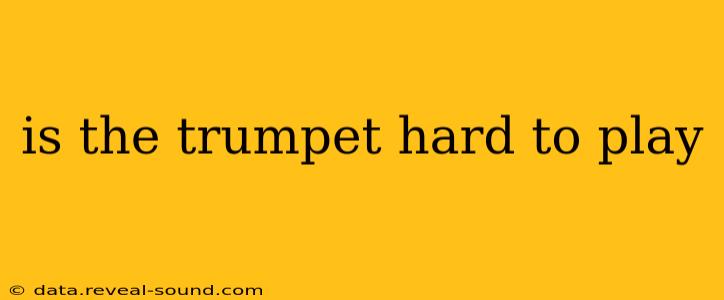The question of whether the trumpet is hard to play is a common one, and the answer, like most things in life, is: it depends. While some find it relatively easy to pick up the basics, mastering the trumpet requires dedication, consistent practice, and a willingness to overcome several significant challenges. This guide will delve into the intricacies of trumpet playing, addressing common concerns and offering insights into what makes this instrument both rewarding and demanding.
What Makes the Trumpet Difficult?
Several factors contribute to the perceived difficulty of playing the trumpet:
-
Embouchure: This is arguably the biggest hurdle. Developing a proper embouchure – the way you use your mouth and facial muscles to produce sound – takes time and patience. It requires precise control and can lead to fatigue and even discomfort if not practiced correctly. Many beginners struggle with achieving a consistent tone and avoiding a breathy or unstable sound.
-
Breath Control: Trumpet playing demands excellent breath control. You need a strong, steady air stream to produce clear, resonant notes across the instrument's range. Developing this control takes significant practice and often involves breathing exercises and controlled airflow techniques.
-
Finger Dexterity: While not as demanding as some other brass instruments, finger dexterity is crucial for accurate note changes and fast passages. Learning to coordinate your fingers efficiently and accurately takes time and practice.
-
Lip Slurs and Flexibility: Moving smoothly between notes without disrupting the tone (lip slurs) is a skill that takes considerable practice. Developing flexibility in your embouchure is essential for playing smoothly and expressively.
How Long Does it Take to Learn Trumpet?
There's no single answer to this question. Progress depends heavily on factors like:
-
Natural Aptitude: Some individuals possess a natural inclination towards music and may find the process easier than others.
-
Practice Frequency and Consistency: Regular, focused practice is paramount. Even short, consistent practice sessions are more effective than infrequent, long ones.
-
Quality of Instruction: A skilled teacher can provide valuable guidance, correct bad habits early on, and accelerate progress significantly.
-
Learning Goals: Simply being able to play a few simple tunes will take far less time than mastering advanced techniques and repertoire.
Realistically, you should expect to spend several months to a year to achieve a basic level of competency. Mastering the instrument will be a lifelong journey of continuous improvement.
Is it Harder Than Other Instruments?
Compared to other instruments, the trumpet's difficulty is relative. Some find it harder than the recorder or ukulele, while others might find it easier than the oboe or cello. The challenges are unique to the trumpet – namely the embouchure and breath control – but with dedicated practice and instruction, these challenges can be overcome.
Can Adults Learn to Play the Trumpet?
Absolutely! Adults can learn to play the trumpet, although they may face some additional challenges. Physical limitations might arise due to existing jaw or lip conditions, but these are often manageable with proper technique and guidance from a teacher. The most crucial factor for adult learners is commitment to regular practice and patience during the learning process.
What are Some Tips for Beginners?
- Find a good teacher: A qualified instructor can provide invaluable guidance and feedback.
- Practice regularly: Even short, focused practice sessions are better than infrequent, long ones.
- Start slowly: Focus on mastering the fundamentals before moving on to more complex techniques.
- Be patient: Learning the trumpet takes time and effort. Don't get discouraged if you don't see results immediately.
- Listen to trumpet players: This will help you develop your ear and understand the nuances of the instrument.
In conclusion, learning the trumpet presents challenges, but the rewards of mastering this expressive instrument are significant. With dedication, perseverance, and the right guidance, anyone can learn to play the trumpet, regardless of age or prior musical experience.
